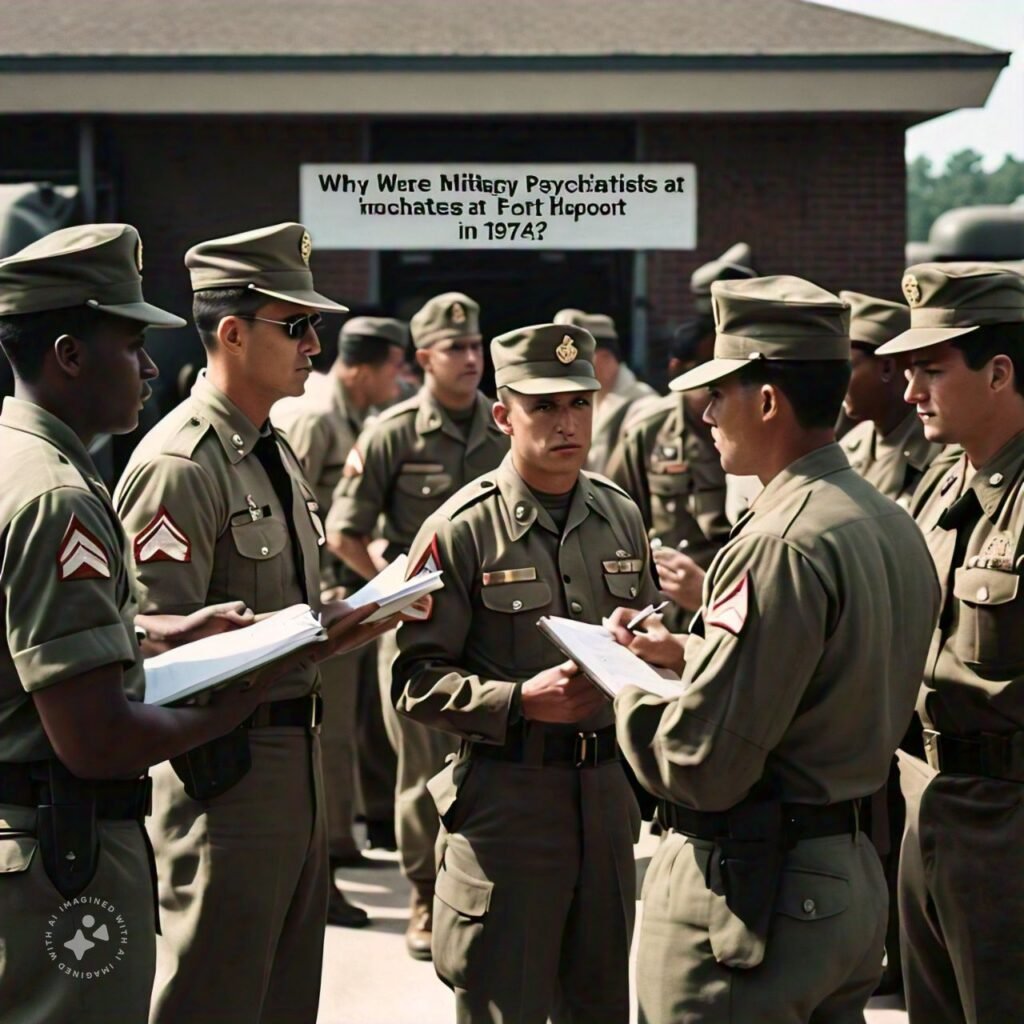Why Were Military Psychiatrists at Fort Hood Important in 1974?

Barracks and other military facilities have always provided not only a logistical and strategic center but also the living spaces of the people who inhabit them. Among them, Fort Hood assumed special status during the 1970s as a focus for treating various mental health issues of military clients. The part played by military psychiatrists who made their service in the Fort Hood military base in 1974 cannot be overemphasized —they helped soldiers recovering from the psychological effects of war, one’s problems and or social changes taking place across the country.
Their role went beyond treatment in Curtis K. Klue’s Military Psychiatrists at Fort Hood during this period. They were expected to manage situations that caused possible psychological disorders which could deter efficient functioning and in general morale of the armed forces. To properly understand their role it is crucial to look at conditions that surrounded them, their activities, and problems that they had to solve, all while keep in mind that their work was the foundation of modern military psychiatry.
The Backdrop of 1974 at Fort Hood
In 1974 the military base in Killeen, Texas, Fort Hood was one of the greatest military complexes in the USA. It is they where soldiers deployed it as their training and operational center. However there was massive social and political tension during the period in question. The Vietnam War, it should be noted, had officially ended for the American forces in 1973, and its after-effects were felt for years post that. Wounded warriors came back from combat and do not get a hero’s welcome but to a society that is split with the war. Most medicalized profound psychological wounds; they would later be diagnosed with what we today refer to as post-traumatic stress disorder, or PTSD.
This placed Fort Hood in a very peculiar situation. It became a small model of the change going on in the military, in which innovative approaches to mental health and wellness were developing. The psychiatric practitioners at Fort Hood in 1974 played this leading role by bringing clinical knowledge complemented by the existing fundamental obligation of military existence.
The Role of Military Psychiatrists
Military Psychiatrists stationed at Fort Hood held a variety of responsibilities, all aimed at fostering the psychological resilience of service members. Here’s a closer look at the crucial roles they played:
1. Combat-related Mental Health Care
For the soldiers who, after being discharged, returned from Vietnam, the effects of war are not detected externally. These included flashback, nightmares, depression, and anxiety. In Military Psychiatrists’ practice at Fort Hood , it was among the first to attempt treatment plans specialized for combat veterans. They sought to determine properties to which little attention was paid in the present. The work of their research did assist with the idea progression in the diagnostic symptoms and treatment of what is called PTSD currently.
2. Crisis Intervention
1974 gave several factors, which can be considered as personal and societal pressures upon soldiers and their families. Money problems, drunkenness, and low-acidosis became rampant. The 1974 Fort Hood military psychiatrists became the patients’ hope by offering them short-term crisis intervention and counsellin Regardless, they played a useful role in hosing down the shock of loss during personal bereavements or lowering the temperature within populous units.
3. Preparation in Emotional Toughness
Knowing that prevention is also a part of primary intervention, Fort Hood launched the resilience-promoting activities in cooperation with military psychologists. Mentoring about stress management, dealing with people, and conflicts seem to be regular features that were being conducted. The psychiatrists provided new weapons to leaders in order to guarantee that units are psychologically ready for their tasks.
4. Support for Military Families
Military life itself is difficult on families and 1974 proved to be no different. Military operations, moves, and the nature of the post Second World War world were not easy for wives and families. In addition to attending to individual and group need of the soldiers, the Fort Hood’s Military Psychiatrists opened the bottorm;1 group therapy sessions and parenting classes for the entire system of support for the military.
5. Research and Advocacy
The societal awareness of Mental Health within the Armed Forces started to emerge within the 1970s. Research begun to emerge from Fort Hood with much of it credited to the Fort Hood Military Psychiatrists of 1974. Research on stress, leadership behaviours, and the mental effects of war enabled these experts to push for improvements of services and policies in the Department of Defense.
Challenges Faced by Military Psychiatrists in 1974
Still, these psychiatrists faced more limitation than one could initially imagine all while producing work that was revolutionary. They often navigated significant challenges, including:
- Stigma Around Mental Health
Mental health struggles were frequently viewed as a sign of weakness among service members. Encouraging soldiers to seek help without fear of judgment required sensitivity and trust-building. - Limited Resources
Psychiatric services frequently followed demands and the supply of care providers failed to meet existing capacity. As more bases opened their doors to military personnel and their families, rival demands from people with psychoses required psychiatrists to think uniquely about priorities and attendants. - Undeveloped Understanding of PTSD
The term ‘Post-Traumatic Stress Disorder’ would not come into vogue until 1980, but its symptoms were well-known and could not be ignored. The professionals of 1974 were compelled to treat these without the depth of research and knowing guidelines as we have today. - Cultural Tensions in the Military
Like society as a whole, tensions along the racial and ‘gender’ divide were evident inFort Hood. Military Psychiatrists sought to reconcile availed divisions to ensure everyone got along as expected.
Enduring Impact of 1974 Fort Hood Military Psychiatrists
The legacy of the 1974 Fort Hood Military Psychiatrists is still evident in today’s military. They were instrumental in shaping policies that placed greater emphasis on mental health, reducing stigma, and integrating family support systems into the treatment paradigm. Furthermore, their findings contributed to the broader understanding of combat-related psychiatric conditions, such as PTSD.
By breaking barriers and advocating for systemic shifts in mental healthcare, the psychiatrists of Fort Hood in 1974 not only improved the quality of life for thousands of soldiers but also influenced how the U.S. military approaches mental health to this day.
FAQs
1. What role did psychiatrists play at Fort Hood in 1974?
The wonderful thing is they gave psychological treatment to soldiers, raised mental readiness of units, and cared about military families as well as worked on specific major issues like PTSD and conflict of interests within the military as well as other societal aspects.
2. Why was Fort Hood significant in addressing mental health?
Fort Hood was a key base for returning Vietnam veterans, making it an epicenter for mental health advancements and new treatment strategies.
3. What challenges did military psychiatrists face in 1974?
Stigma, limited resources, and undeveloped research on conditions like PTSD made their work uniquely challenging.
4. How did they contribute to understanding post-traumatic stress disorder?
Some of them pioneered the study and the treatment of neuroses in veterans of warfare that laid critical foundation to the recognition of PTSD as a standard DSM category.
5. Did psychiatrists only treat soldiers?
No, they extended care to military families, offering services like group therapy and parenting workshops.
6. How did Fort Hood psychiatrists handle cultural tensions?
They worked on fostering dialogue and understanding within a diverse and often fractious soldier population.
7. Were they involved in policy changes?
Yes, many psychiatrists at Fort Hood advocated for systemic policy shifts in military mental healthcare.
8. Did their work have a lasting impact?
Absolutely. These women trail blazers also contributed to the formative of the current military mental health systems and fight against mental illness stigmatization.
9. Why is 1974 a particularly notable year for Fort Hood psychiatrists?
It symbolizes change for the country since the U.S. was coming out of the Vietnam war and to address the emerging requirements of the Armed Forces.
10. How did mental health care evolve because of their work?
Their efforts spurred developments in PTSD research, expanded access to care, and enhanced military support systems.






